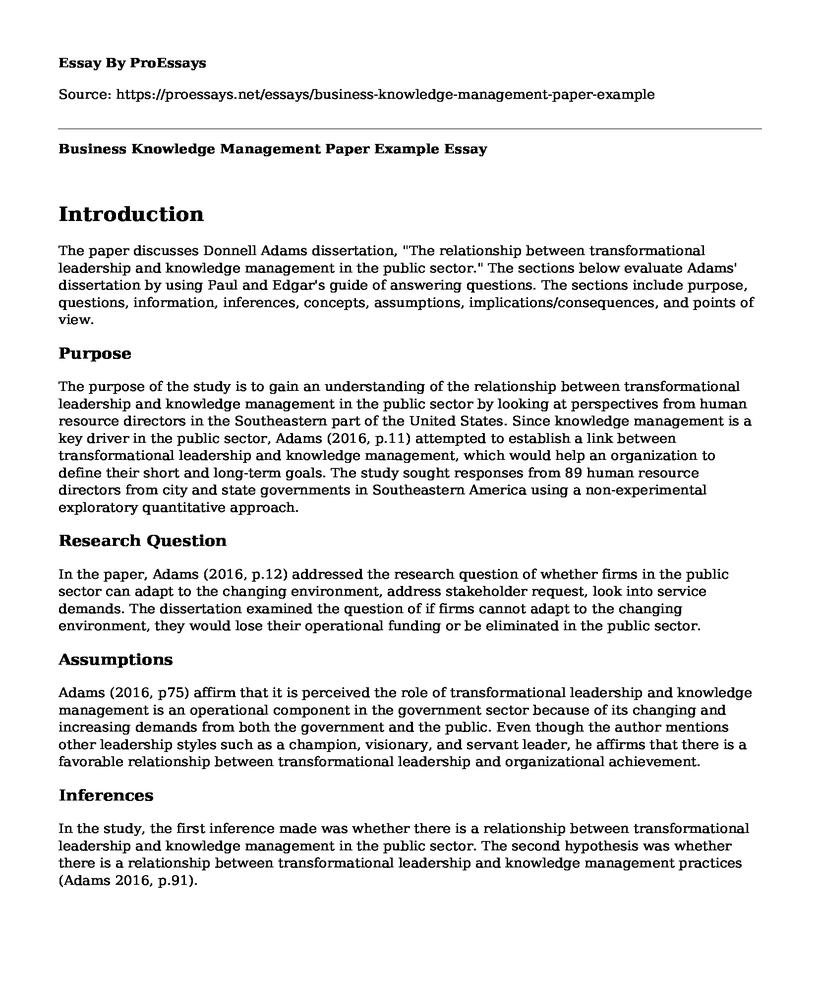Introduction
The paper discusses Donnell Adams dissertation, "The relationship between transformational leadership and knowledge management in the public sector." The sections below evaluate Adams' dissertation by using Paul and Edgar's guide of answering questions. The sections include purpose, questions, information, inferences, concepts, assumptions, implications/consequences, and points of view.
Purpose
The purpose of the study is to gain an understanding of the relationship between transformational leadership and knowledge management in the public sector by looking at perspectives from human resource directors in the Southeastern part of the United States. Since knowledge management is a key driver in the public sector, Adams (2016, p.11) attempted to establish a link between transformational leadership and knowledge management, which would help an organization to define their short and long-term goals. The study sought responses from 89 human resource directors from city and state governments in Southeastern America using a non-experimental exploratory quantitative approach.
Research Question
In the paper, Adams (2016, p.12) addressed the research question of whether firms in the public sector can adapt to the changing environment, address stakeholder request, look into service demands. The dissertation examined the question of if firms cannot adapt to the changing environment, they would lose their operational funding or be eliminated in the public sector.
Assumptions
Adams (2016, p75) affirm that it is perceived the role of transformational leadership and knowledge management is an operational component in the government sector because of its changing and increasing demands from both the government and the public. Even though the author mentions other leadership styles such as a champion, visionary, and servant leader, he affirms that there is a favorable relationship between transformational leadership and organizational achievement.
Inferences
In the study, the first inference made was whether there is a relationship between transformational leadership and knowledge management in the public sector. The second hypothesis was whether there is a relationship between transformational leadership and knowledge management practices (Adams 2016, p.91).
Concepts
Adams (2016, p.13) uses various concepts in the dissertation. For example, he uses the concept knowledge management to describe the process of gaining and sharing knowledge to attain organizational objectives. The other one is knowledge management theory to define the process of gaining and sharing knowledge by using organizational knowledge. The other is transformational leadership to describe collaborative effort of leaders and followers to achieve organizational objectives and transformational leadership theory to describe the leadership associated with positive relationship. Additionally, he uses the term espoused theory to define the knowledge employees claim to have and the collaboration that exists between individuals. Also, he uses the term individualized consideration, which explains a leader's ability to make their followers gain their full potential. Besides, he uses the term idealized influence to define a leader's ability to influence followers positively. Furthermore, he uses the concept intellectual stimulation to describe a leader's ability to help their followers think differently. Another concept used in the dissertation is inspirational motivation to describe the follower's articulation of goals. The other concept is theory-in-use to describe rules, which individuals follow when given an opportunity to come up with their practices and actions.
Point of View
From the author's perspective, organizational leaders in the public sector have to provide appropriate leadership to their citizens. Also, the type of leadership style plays a significant role in ensuring firms meet the expectations of internal and external stakeholders.
Implications
The study draws various implications for practice. For example, organizations can see the relevance of transformational leadership style as a motivator for the display of knowledge management. Furthermore, leaders in the public sector can draw conclusions from the dissertation to determine the type of leadership style, which is effective in achieving their organizational goals.
Conclusion
In the dissertation, the author finds a relationship between transformational leadership and knowledge management practices in the public sector. However, they fail to find a relationship between transformational leadership and knowledge management. The paper evaluates Adams dissertation based on Paul and Edgar's guide of evaluation. Overall, leaders in organizations have to employ the transformational leadership style in their knowledge management practices to ensure that they achieve success.
Reference
Adams, D.E. (2016). The relationship between transformational leadership and knowledge management in the public sector. (Order No. 10161141). Available from Dissertations &Theses @ Capella University. (1845882668).
Cite this page
Business Knowledge Management Paper Example. (2022, Nov 21). Retrieved from https://proessays.net/essays/business-knowledge-management-paper-example
If you are the original author of this essay and no longer wish to have it published on the ProEssays website, please click below to request its removal:
- Management Essay Example: Effective Change Agents in Organizations
- Research Paper Example: Cloud Computing in the Hospitality Industry
- Discharged for Off-Duty Behavior Paper Example
- Essay Sample on Team Working: Dangers & Costs of Poor Care for Patients
- Xerox: 106 Years of Innovating and Market Leadership - Research Paper
- Innovation and Managing Change in Apple Inc and Nokia Corporation - Essay Sample
- Essay Example on Live Life With No Regrets: Make Conscious Choices







